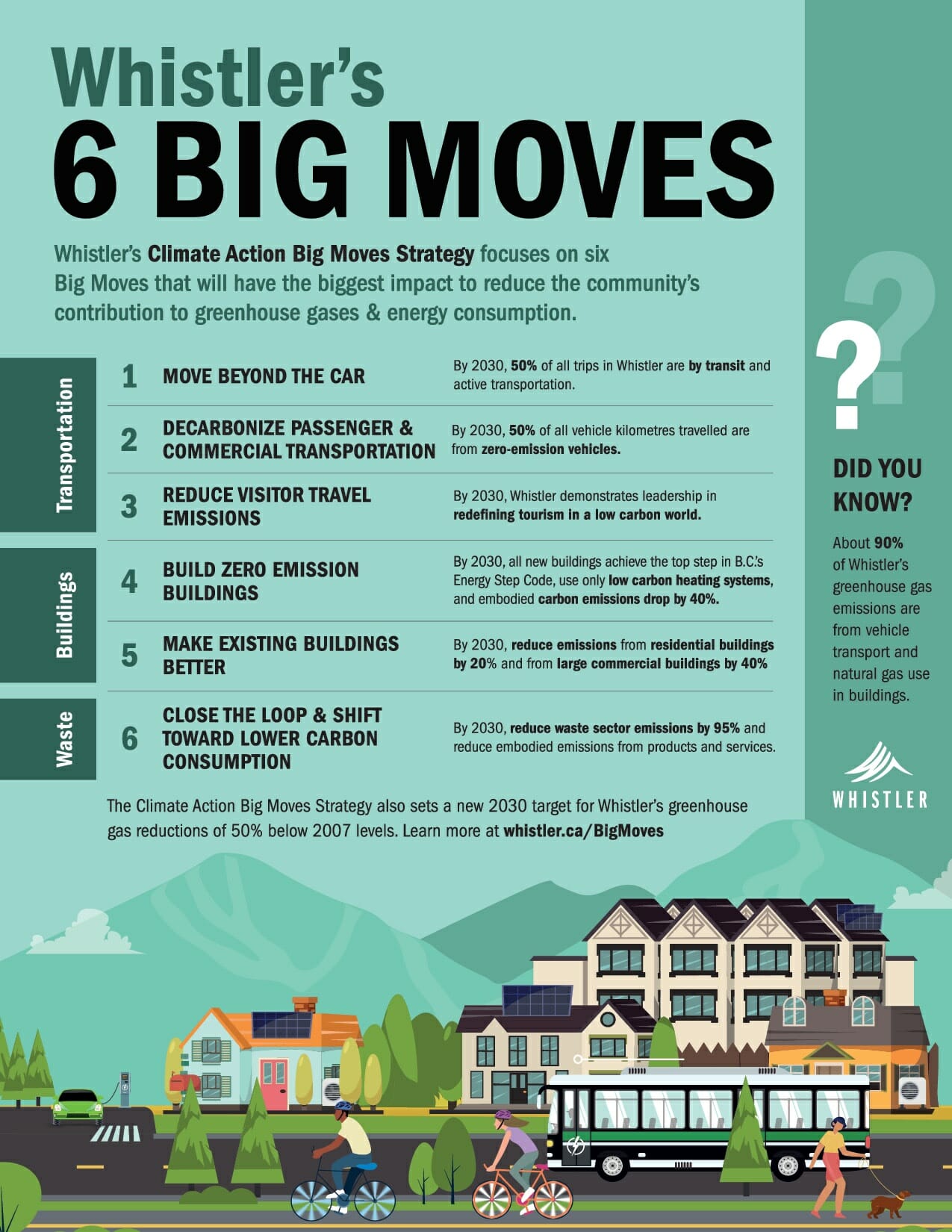

In response to the climate crisis, the RMOW has developed the Climate Action Big Moves Strategy that identifies top priority areas for action and moves forward using the Big Moves Climate Action Implementation Plan.
The Climate Action Big Moves Strategy focuses on transportation, buildings, and waste, and articulates the key strategies Whistler will need to further reduce greenhouse gas emissions to meet its targets. The Big Moves approach is being used by many other leading cities and communities, so Whistler is in good company as it embarks on this strategic path.

Current status
The Climate Action Big Moves Strategy was adopted by Council on December 15, 2020. The Big Moves Climate Action Implementation Plan was adopted by Council on August 2, 2022.
The new target commits Whistler to reducing GHG emissions by 50 per cent below 2007 levels by 2030.
Overview
The project is being executed in three phases as outlined below. Phase 2 and 3 involve stakeholder and community engagement. We are now in phase 3.
Phase 1: Project planning and draft strategy development (December 2019 – June 2020)
This phase focused on the development of the draft strategy and ensuring the project was well planned and resourced. It used the Community Energy Association’s Climate Leaders Playbook approach, community monitoring evidence, Whistler’s CECAP, staff expertise and external advisory input to identify six Big Moves for transportation, buildings and waste.
Phase 2: Strategy review, revision and approval (July – December 2020)
This phase focused on gathering community input and presenting the strategy to Council for approval.
- Local energy and climate change mitigation experts (including key CECAP advisory group members)
- Community members
- Key partner organizations
The draft strategy was presented to Whistler Council in July 2020 and was subsequently workshopped through direct consultation with key partners and collecting feedback from the community through the Making Big Moves for Climate survey. Information gathered was used to refine the Big Moves Strategy, with the finalized strategy brought to council and adopted in December 2020.
A climate Big Moves Survey was also issued to the community from September and October 2020. A total of 602 people responded to the survey, representing a response rate of about four percent, based on Whistler’s 2019 permanent resident population.
Examples from the survey responses include support for the following initiatives:
- Highway shoulder safety improvements for cyclists
- Financial rebates/assistance to purchase an electric vehicle
- Partnerships with car rental agencies to make electric vehicles available for visitors
- Provincial incentive top-ups for low carbon heating (e.g heat pumps)
- Lowered initial investment for retrofitting buildings
- Increasing availability of bulk or zero packaging consumer products
View the full community results.
Phase 3: Strategy execution and action planning (2021 onwards)
This is when the challenging work really begins – but it is also when we have the exciting opportunity to accelerate our journey toward a low-carbon future that is better and brighter for everyone.
Phase 3 focuses on working with the key players needed to advance the Big Moves. And these key players involve everyone – all community members – as well as those entities that can accelerate and catalyze the climate action needed.
Some of the first steps the RMOW will take include developing a comprehensive, five-year multi-departmental implementation and financial plan, and continuing to use Whistler’s annual Energy and GHG Inventory Report as a key monitoring tool. The RMOW will continue to reach out to the community and key stakeholders to engage on the climate strategy and actions.
Climate action will be embedded into municipal decision-making, procurement, and corporate operations, include a GHG impact tool to inform on the climate strategy alignment for proposed RMOW projects and processes and to weave climate action into the annual RMOW budget process.
More details on next steps can be viewed in the December 15, 2020 council report and in the Big Moves Climate Action Implementation Plan, that replaced the 2016 CECAP.
Background
Building on Whistler’s leading practices to reduce greenhouse gas emissions, Whistler’s Community Energy and Climate Action Plan (CECAP) was developed in 2016, setting out strategic directions and practical actions to further reduce Whistler’s contribution to climate change, as well as recommending prioritized adaptation strategies to prevent or minimize the key potential impacts of projected local climate changes. More than 30 leaders from across the community worked together with the RMOW project management team to develop the comprehensive list of actions for climate, clean energy, and adaptation opportunities for Whistler.
Since the 2016 CECAP update, the need to address climate change has become even more urgent. A recent Intergovernmental Panel on Climate Change report with new warnings and a more ambitious target and timeline has heightened public concern. We are experiencing global climate strikes, and cities and communities around the world are declaring climate emergencies – all indications that the time to act in a very focused, strategic and collaborative way is now.
To help cities and communities lead and take action in response to the climate crisis, a set of Big Moves were developed by the Community Energy Association to help focus climate mitigation efforts. These Big Moves will help to inform and provide the foundation for Whistler’s focused strategy now being developed.
On August 2, Council adopted the Big Moves Climate Action Implementation Plan, which consolidated the Big Moves Strategy and the CECAP to prioritize and focus efforts. The two documents have guided climate change mitigation and adaptation efforts since their adoption, and this consolidated plan aligns the work, standardizes reporting and identifies how the initiatives underway are advancing.
Funding
The preparation of this plan was carried out with assistance from the Government of Canada and the Federation of Canadian Municipalities. Notwithstanding this support, the views expressed are the personal views of the authors, and the Federation of Canadian Municipalities and the Government of Canada accept no responsibility for them.
Funding for the Climate Action Big Moves projects comes from the Climate Action Revenue Incentive Program (CARIP), a provincial grant program that must be allocated toward climate mitigation initiatives. CARIP provides local governments with funding equal to 100 percent of the carbon taxes paid on fossil fuel use related to corporate operations.
Contact
Climate and Environment
climatechange@whistler.ca



